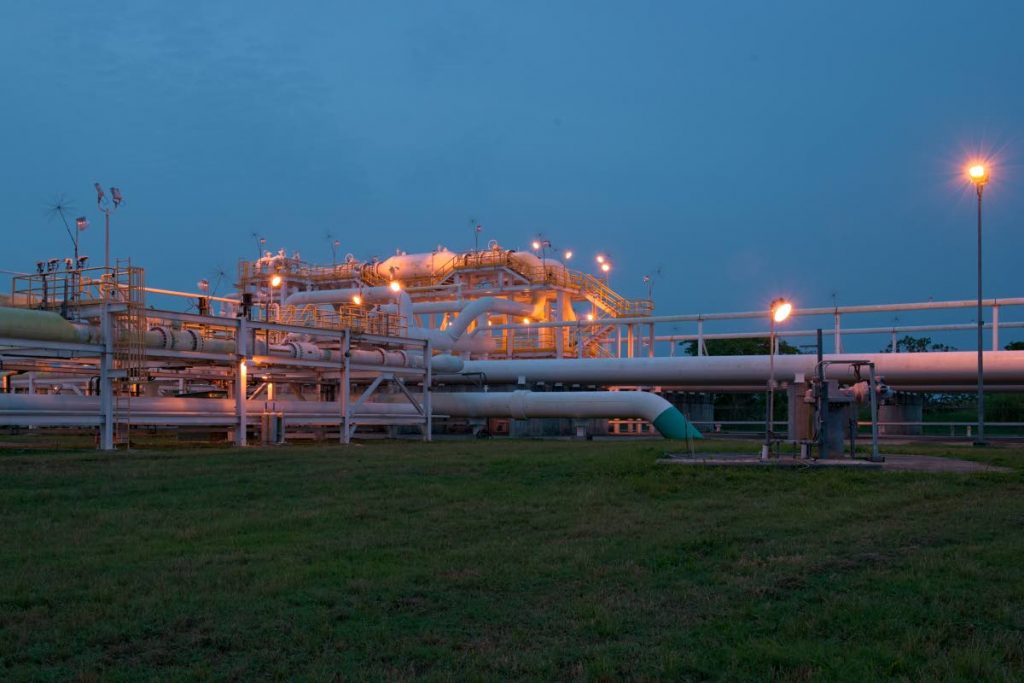NGC: Building a house of sustainability

NGC president Mark Loquan shares his optimism for the state energy giant amid concerns about the financial blow it took in the first half of this pandemic-hit year, in part one of an interview with associate editor CARLA BRIDGLAL.
The National Gas Company (NGC) has long been a beacon of stability, the crown jewel of state enterprises, delivering a steady stream of dividends to the government, over its 45-year history. But for the first time ever, in its half-year financial report for 2020, the company announced a loss – $316.2 million, down 296 per cent, or $477.3 million, compared to the same period before. As overwhelming as that sounds, however, it needs to be put into context.
NGC has endured extenuating circumstances over the last few months, not the least being the cumulative dampening effect of the covid19 pandemic on global demand for energy products, including natural gas. And even before that, the petrochemical industry, for which natural gas is a feedstock, has been going through one of its cyclical troughs with low demand, low prices and oversupply in the market. The company’s predicament, then, is not unique. (BP, for example, announced its 2020 half-year loss was US$21.2 billion, while Shell’s loss was US$18.15 billion.)
The important thing, though, is to have a plan. And while things might look rough for the overall industry over the next 12 to 18 months, NGC president Mark Loquan is confident the company is well-prepared and well-positioned to capitalise, not just when market demand rebounds, but also as industry trends start to shift from fossil fuels to cleaner, renewable resources.
“I always like to put things in context. Yes, we are going through what you might call the perfect storm – low ammonia prices, low methanol, low natural gas liquids (NGL) prices, low liquefied natural gas (LNG) prices – even some volume issues because not all plants are able to run. The question for me is what do you do during this time, because if we were kind of doing the business the same way and hoping and praying everything would work out then I’d be a little worried.
"In time, things will recover and the economy will rebound. So, the real question is what is NGC’s strategy and how do you get through a wave like this – are you going to be in the same shape, worse shape or better shape?” Loquan told Business Day in a recent interview.
Luckily, even before covid19, NGC had already started transforming itself, diversifying within the energy sector to be more than just a company that buys and sells gas. The company has sought to increase its footprint internationally and regionally, with NGL acquisitions in the United States (US) via its subsidiary PPGPL. In Ghana, the company is consulting with the government on developing that country’s nascent energy industry; similarly, in Guyana, it is also offering its services and expertise, recently setting up an office. Throughout the region, it is increasing its exports as islands move from petroleum-based fuels like fuel oil for energy generation to cleaner burning LNG. And since the shale gas revolution in the US (the country used to be the biggest market for TT’s natural gas but as of last year, became a net exporter), NGC has been searching for new markets, many in the Far East like China, which is also trying to clean up its act by reducing its use of coal.

Photo by courtesy NGC/Shaun Rambaran -
“I think you can see the NGC is doing things. We are building a house for sustainability,” Loquan said. There are four pillars in that house: developing the organisation; secure current business; grow locally and internationally; and strengthen its national contribution.
“How do you make yourself more relevant? We are providing power to the country – the lights are on even though covid19 has come along. We are also removing a lot of disturbances on the downstream side as an aggregator so the downstream plants continue to run. So, there’s a lot of stability that is happening. Then there’s the question of renewables and that whole agenda. If you look at climate change and how that affects the Caribbean, it’s not an issue that can be ignored,” Loquan said.
In frank outspokenness not expected from the head of a major national energy corporation, he outlined NGC’s green agenda, including pushing the use of compressed natural gas (CNG) as a fuel – not just for new cars but for existing gasoline and diesel engine cars. The company is also promoting energy efficiency, including launching a mobile app for people to calculate their energy usage. And through its subsidiary National Energy, it is investing in and facilitating renewable energy projects in TT, including the BP-Shell-Light Source consortium. The company also employs cutting-edge technology like infrared cameras to measure and monitor its infrastructure for leaks. “We are even on the International Gas Union’s group of technical experts regarding methane (monitoring),” Loquan said. The NGC is also involved in reforestation projects. “We are going to get more aggressive with these projects. We are also positing ourselves in a way where we can influence not just Trinidad and Tobago but the region.”
The TTEC burden
One thing that’s holding the company back from achieving its fullest potential is its complicated relationship with another state enterprise – electricity distributor TTEC – and the perpetual quagmire of government transfers and subsidies.
“It can’t continue like this. You’re talking in the order of $1.5 billion a year that is affecting the cash flow of NGC. You can only run for a certain time like that before you run into serious liquidity cash flow issues,” Loquan said. It’s a tricky situation because the three main actors – the NGC, TTEC and the Ministry of Public Utilities – are agents of the State.
“Our response has been to take this matter up with the right people – the Ministry of Public Utilities and the government and try to find solutions. This isn’t going to be solved next week by any means but it certainly means if you look at Trinidad there’s clearly a subsidy in electricity where people waste electricity.”
The average cost of electricity in TT is among the lowest in the world – about US$0.05 per kilowatt hour. Compare that to Barbados (US$0.28) or Jamaica (US$0.39) and the rest of the Caribbean, where the average cost is US$0.33 per kwh.
“The truth of the matter is we are at a point in time where we need to deal with this issue and the issue of subsidies now as you see because even the government can’t afford to (maintain) some these subsidies either so it really requires a solution that might include electricity rate (increases) whatever that might be," Loquan said. "At the end of the day we have been doing our part – keeping things stable keeping light on during covid19, raising the issue as we have, focusing on energy efficiency and looking at renewables.”
Other islands in the region have been forced to invest in renewable energy for electricity generation – including Barbados with solar and Jamaica with wind. “I wish renewables would just take care of the whole issue with power sector but you are now beginning to see that phase (in TT),” Loquan said.
NGC provides TTEC about 250 million standard cubic feet of natural gas a day.
“If you didn’t have the subsidies and were selling it at a normal price that would be about $500 million a year that you would be able to add on; that’s certainly a profit and loss effect you’re getting,” he said. How long, then, can NGC keep floating this bill?
“Well, I hope it doesn’t come to (blackouts),” Loquan laughed. “The responsible thing for us to do is show the impacts on cash flows, which I think we have been doing. It is really to be solved by a number of parties and the government. I don’t want to speak on their behalf but it is an urgent issue that we have been talking about, certainly since I came on board in 2016.” He again advocated for a push on renewables and being energy efficient.
“We are entering a world where the focus on renewables is taking shape so that is helping the whole issue of energy efficiency for the future. That’s a free fuel. Reducing demand will also use less fuel and obviously contributes to energy efficiency, which is also as important as renewables,” he said.

Comments
"NGC: Building a house of sustainability"